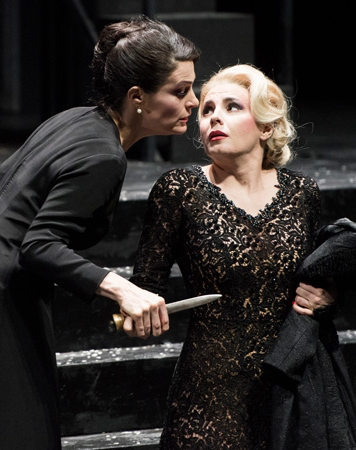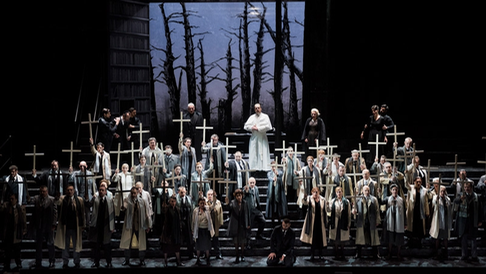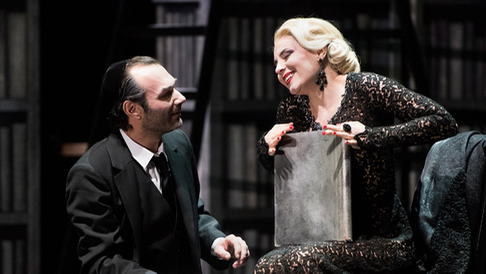
22 Mar 2016
La Juive in Lyon
Though all big opera is called grand opera, French grand opera itself is a very specific genre. It is an ephemeral style not at all easy to bring to life. For example . . .
English Touring Opera are delighted to announce a season of lyric monodramas to tour nationally from October to December. The season features music for solo singer and piano by Argento, Britten, Tippett and Shostakovich with a bold and inventive approach to making opera during social distancing.
This tenth of ten Live from London concerts was in fact a recorded live performance from California. It was no less enjoyable for that, and it was also uplifting to learn that this wasn’t in fact the ‘last’ LfL event that we will be able to enjoy, courtesy of VOCES8 and their fellow vocal ensembles (more below …).
Ever since Wigmore Hall announced their superb series of autumn concerts, all streamed live and available free of charge, I’d been looking forward to this song recital by Ian Bostridge and Imogen Cooper.
The Sixteen continues its exploration of Henry Purcell’s Welcome Songs for Charles II. As with Robert King’s pioneering Purcell series begun over thirty years ago for Hyperion, Harry Christophers is recording two Welcome Songs per disc.
Although Stile Antico’s programme article for their Live from London recital introduced their selection from the many treasures of the English Renaissance in the context of the theological debates and upheavals of the Tudor and Elizabethan years, their performance was more evocative of private chamber music than of public liturgy.
In February this year, Albanian soprano Ermonela Jaho made a highly lauded debut recital at Wigmore Hall - a concert which both celebrated Opera Rara’s 50th anniversary and honoured the career of the Italian soprano Rosina Storchio (1872-1945), the star of verismo who created the title roles in Leoncavallo’s La bohème and Zazà, Mascagni’s Lodoletta and Puccini’s Madama Butterfly.
Evidently, face masks don’t stifle appreciative “Bravo!”s. And, reducing audience numbers doesn’t lower the volume of such acclamations. For, the audience at Wigmore Hall gave soprano Elizabeth Llewellyn and pianist Simon Lepper a greatly deserved warm reception and hearty response following this lunchtime recital of late-Romantic song.
Collapsology. Or, perhaps we should use the French word ‘Collapsologie’ because this is a transdisciplinary idea pretty much advocated by a series of French theorists - and apparently, mostly French theorists. It in essence focuses on the imminent collapse of modern society and all its layers - a series of escalating crises on a global scale: environmental, economic, geopolitical, governmental; the list is extensive.
For this week’s Live from London vocal recital we moved from the home of VOCES8, St Anne and St Agnes in the City of London, to Kings Place, where The Sixteen - who have been associate artists at the venue for some time - presented a programme of music and words bound together by the theme of ‘reflection’.
'Such is your divine Disposation that both you excellently understand, and royally entertaine the Exercise of Musicke.’
Amongst an avalanche of new Mahler recordings appearing at the moment (Das Lied von der Erde seems to be the most favoured, with three) this 1991 Mahler Second from the 2nd Kassel MahlerFest is one of the more interesting releases.
‘And there was war in heaven: Michael and his angels fought against the dragon; and the dragon fought and his angels, And prevailed not; neither was their place found any more in heaven … that old serpent … Satan, which deceiveth the whole world: he was cast out into the earth, and his angels were cast out with him.’
If there is one myth, it seems believed by some people today, that probably needs shattering it is that post-war recordings or performances of Wagner operas were always of exceptional quality. This 1949 Hamburg Tristan und Isolde is one of those recordings - though quite who is to blame for its many problems takes quite some unearthing.
There was never any doubt that the fifth of the twelve Met Stars Live in Concert broadcasts was going to be a palpably intense and vivid event, as well as a musically stunning and theatrically enervating experience.
‘Love’ was the theme for this Live from London performance by Apollo5. Given the complexity and diversity of that human emotion, and Apollo5’s reputation for versatility and diverse repertoire, ranging from Renaissance choral music to jazz, from contemporary classical works to popular song, it was no surprise that their programme spanned 500 years and several musical styles.
The Academy of St Martin in the Fields have titled their autumn series of eight concerts - which are taking place at 5pm and 7.30pm on two Saturdays each month at their home venue in Trafalgar Square, and being filmed for streaming the following Thursday - ‘re:connect’.
The London Symphony Orchestra opened their Autumn 2020 season with a homage to Oliver Knussen, who died at the age of 66 in July 2018. The programme traced a national musical lineage through the twentieth century, from Britten to Knussen, on to Mark-Anthony Turnage, and entwining the LSO and Rattle too.
With the Live from London digital vocal festival entering the second half of the series, the festival’s host, VOCES8, returned to their home at St Annes and St Agnes in the City of London to present a sequence of ‘Choral Dances’ - vocal music inspired by dance, embracing diverse genres from the Renaissance madrigal to swing jazz.
Just a few unison string wriggles from the opening of Mozart’s overture to Le nozze di Figaro are enough to make any opera-lover perch on the edge of their seat, in excited anticipation of the drama in music to come, so there could be no other curtain-raiser for this Gala Concert at the Royal Opera House, the latest instalment from ‘their House’ to ‘our houses’.
"Before the ending of the day, creator of all things, we pray that, with your accustomed mercy, you may watch over us."

Though all big opera is called grand opera, French grand opera itself is a very specific genre. It is an ephemeral style not at all easy to bring to life. For example . . .
The first production (1835) of La Juive at the Paris Opera demanded 20 horses on stage (in Lyon there was not even one!). In 1835 Paris la juive and Eléazar, her father threw themselves into a cauldron of water boiling upon a huge fire (in Lyon there was no leap, no cauldron or flame, the victims merely strode up stage into vague wisps of theatrical fog).
Not that the Opéra de Lyon was economizing as the sets were huge and complicated. Huge scenic elements moved continuously on and off a cross-stage moving belt, upstage there was another belt moving a forest of huge burned tree carcasses back and forth almost constantly. All of this was elevated 8 feet (2 1/2 meters) above the stage floor. An enormous bank of steps crossing the entire down stage descended to the stage floor (there was a net covering the orchestra pit to catch anyone who might trip and tumble). Not to mention the huge flat that hung flat way up above the stage, lighted spectacularly from time to time (surely a lighting designer’s nightmare).
 Roberto Scandiuzzi as Cardinal Brogni (production design by Pierre-André Weitz)
Roberto Scandiuzzi as Cardinal Brogni (production design by Pierre-André Weitz)
And surely a conductor’s nightmare in his attempts to coordinate the pit with the stage where in addition to the initial 8’ elevation much singing occurred on the additional three levels of a tower from which la juive and her father did not fling themselves into the cauldron [our assumption when we saw the tower in the first act was that it surely would serve such purpose].
The pit however was where the strengths of the production emanated. 33 year-old conductor Daniele Rustioni (music director designate of the Opéra de Lyon) ran a tight ship, feeling and communicating every quiver of musical emotion and energy from the soles of his feet to tips of his fingers (he conducted without stick). [I sat above the pit for the first act and had full view of this amazing young conductor.]
Metteur en scène Olivier Py and his designer Pierre-André Weitz envisioned Halévy’s opera in tones of black, the color of traditional European Jewish clothing, allowing only Cardinal Brogni and the catholic congregation to be clothed in light or white tones of generic modern dress. La juive’s nemesis, the Princess Eudoxie was in a lacy black gown allowing flesh to be seen (a lot of it from time to time), and she was wigged like a gangster moll. In her seduction of Leopold she slithered into brilliant red stockings [fueling our expectation that there would be red flames for la juive’s immolation though of course finally there were no flames].
The plot: Leopold returns victorious from a war to be received as a hero by the Christian people and Princess Eudoxie. He is however in love with la juive so he must pretend to be a Jew. When this pretense is discovered he flees to the palace into the arms of the princess. The Christians hear the news and condemn Leopold, la juive and her father to death. La juive and Princess Eudoxie agree that la juive will exonerate Leopold, sacrificing herself to the [absent] flames. When it is too late la juive’s father Eléazar tells the Cardinal Brogni that the juive is in fact the cardinal’s long lost daughter.
 Nikolai Schukoff as Eléazar, Sabina Puértolas as Princess Eudoxie
Nikolai Schukoff as Eléazar, Sabina Puértolas as Princess Eudoxie
Evidently all this is not really about religious tolerance. It is about making a story with emotive moments without inciting public judgement about Christians immolating Jews or Jews murdering anyone who profanes their rites. It is about love, forgiveness and sacrifice. French grand opera is purely about opportunities to sing and there were lots of them — declarations of love, denunciations of love, of vengeance, of pity, of anger, trios and sextets of frustration, incomprehension or comprehension. And huge choruses of support for all the above.
The cast for this grand opera event in Lyon generally lacked the power of voice, the color of voice and the stamina of voice to guide us safely through the musical intricacies of Halévy’s lengthy, singerly score (vocally it lies between Rossini and early Wagner). Agility for coloratura is a prime requirement, but equally important there must also be stamina for carving out longer phrases. Plus as characters have specific motivations voices must be those that add appropriate color to words and actions. Not that there was not a lot of fine singing. It was simply that most of the singing did not create big enough effect.
French grand opera composers structured the arias and ensembles to impress audiences who would then respond with applause. Few of the arias or ensemble in Lyon got applause, and when there was applause it was tepid. The hugest scene, the finale of Act III with all principles and the chorus of Christians on stage, had little effect because the too small voices of the principals could not soar over the chorus — blame also the place on the stage where the chorus was seated. It was a perfect megaphone, amplifying the chorus voices to the point that they shattered (sound waves colliding), ruining this magnificent scene.
Still it was a French grand opera and it is not often that these lengthy, difficult operas are staged in any manner. N.B There was no ballet, an integral component of French grand opera, though I am not sure where it should have occurred.
La Juive is the centerpiece of the Opéra de Lyon’s mid-winter festival, this year Festival pour l’Humanité, with the theme of tolerance. Metteur en scène Olivier Py could not help editorializing — in the Act I finale the Christian chorus places itself down stage center with placards urging “France for the French,” “Out with the Jews” [read Muslims], and in the silence prior to Act V (the death by fire) hundreds of shoes [the death-oven image] fell from the rafters. In coincidence both La Juive and Benjamin, Dernière Nuit used the library image to establish the presence of humanity in this Festival pour l’Humanité.
Michael Milenski
Casts and production information:
Eléazar: Nikolai Schukoff; Rachel: Rachel Harnisch; Princesse Eudoxie: Sabina Puértolas; Leopold: Enea Scala; Cardinal Brogni: Roberto Scandiuzzi; Ruggiero: Vincent Le Texier; Albert: Charles Rice. Chorus and Orchestra of the Opéra de Lyon. Conductor: Daniele Rustione; Mise en scène: Olivier Py; Scenery and costumes: Pierre-André Weitz; Lighting; Bertrand Killy. Opéra de Lyon, March 19, 2016.